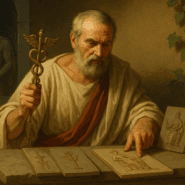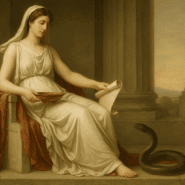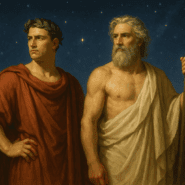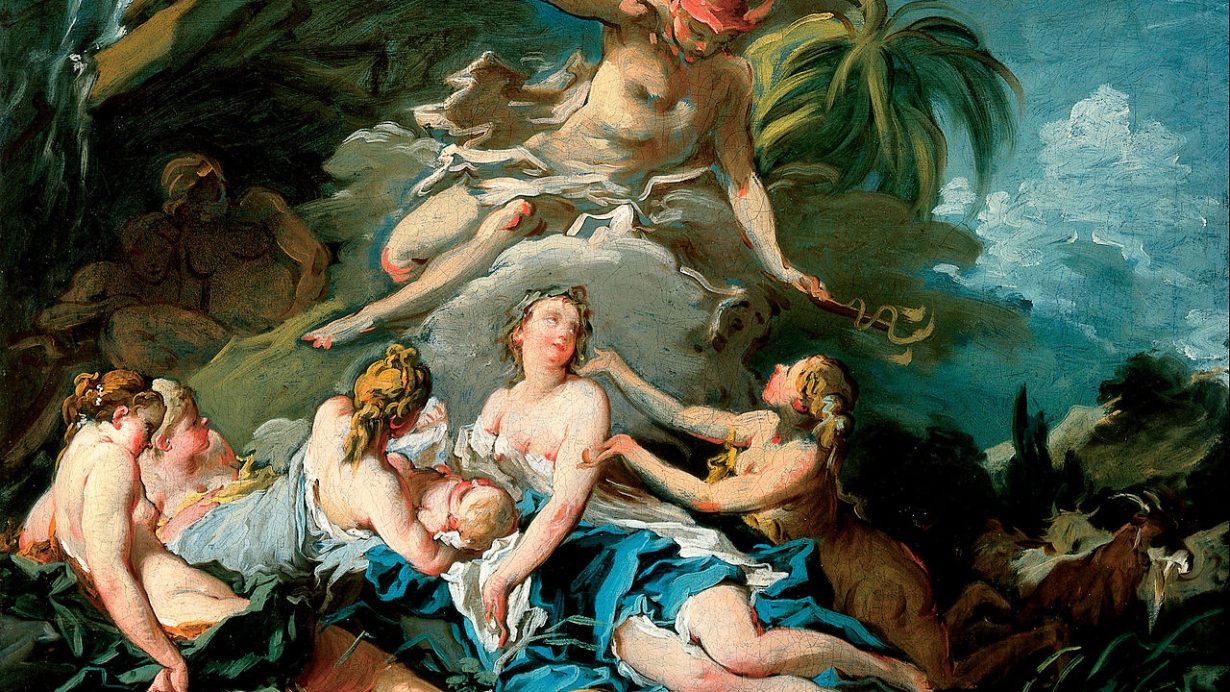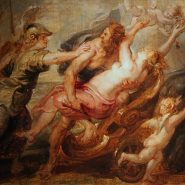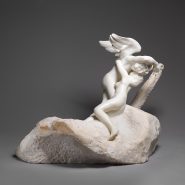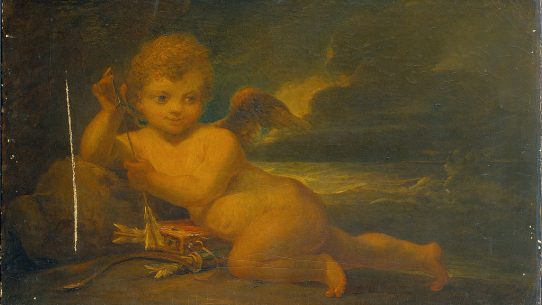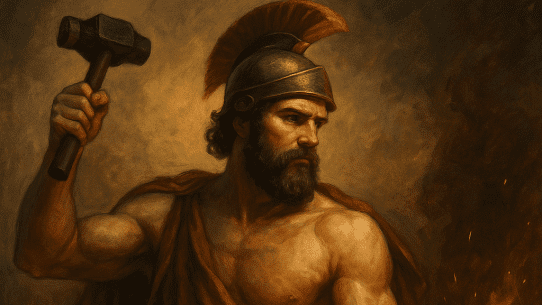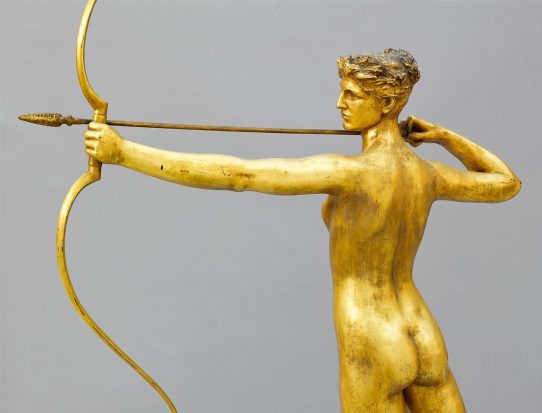Mercury, the swift messenger of the gods, was among the most versatile and beloved figures in Roman mythology. He governed communication, trade, travel, and cleverness — the divine embodiment of movement and exchange. To the Romans, Mercury represented wit and adaptability: the power to navigate both divine and mortal worlds with speed and skill.
As protector of merchants, travelers, and even thieves, he embodied the restless energy of civilization itself. His influence touched every part of Roman life, from bustling markets to diplomatic missions, from the journeys of traders to the prayers of wayfarers.
Name and Origin
The name “Mercury” comes from the Latin word merx, meaning “merchandise,” reflecting his association with commerce and profit.
Originally an Italic deity of trade and boundaries, Mercury absorbed the traits of the Greek god Hermes when Greek culture spread through Italy. The Romans, however, emphasized his practical wisdom over mischief, celebrating him as a bringer of prosperity and understanding between peoples.
His worship symbolized the growing complexity of Roman society — its economy, diplomacy, and need for communication across vast distances.
Attributes and Symbols
Mercury was often depicted as a youthful and athletic god, wearing a winged hat called a petasus and winged sandals known as talaria. In his hand he carried the caduceus — a herald’s staff entwined with two serpents, symbolizing balance and negotiation.
His sacred animals included the rooster, a sign of vigilance, and the ram, representing wealth and fertility. Artists showed him in constant motion, light on his feet, his expression alert and thoughtful.
These symbols captured his essence as the mediator between gods and humans, heaven and earth, commerce and communication.
Family and Relationships
Mercury was the son of Jupiter and Maia, one of the Pleiades. Born at dawn, he demonstrated his cunning from infancy, stealing the cattle of Apollo before the day had ended. Yet through charm and intelligence, he turned Apollo’s anger into friendship, offering him the lyre as reconciliation.
This story revealed Mercury’s gift for diplomacy and his ability to transform conflict into harmony. Though not bound by marriage or family in myth, he was often linked romantically to Venus, goddess of love, a union symbolizing attraction and persuasion — the soft power that moves hearts and nations alike.
Myths and Stories
Roman poets delighted in tales of Mercury’s cleverness and agility.
One famous myth tells of his theft of Apollo’s cattle. After walking the animals backward to disguise their tracks, the infant god returned home as though innocent. When confronted, he played the lyre he had just invented, charming Apollo and earning forgiveness.
The story, retold in Roman verse, celebrated intelligence as a form of divine artistry. In another legend, Mercury guided the hero Aeneas through the underworld and urged him to fulfill his destiny — serving as both counselor and guide of souls.
Mercury was also known as Psychopompos, the conductor of spirits to the afterlife. This role made him a bridge between worlds: not merely a god of trade, but of transition. To the Romans, this dual nature — practical and spiritual — made him a symbol of life’s constant motion and the necessity of wit and adaptability in uncertain times.
Domains and Powers
Mercury presided over commerce, travel, eloquence, and invention. He was the patron of merchants, messengers, and all who lived by skill and intellect.
As guardian of crossroads, he watched over travelers and traders who ventured beyond the safety of their cities. His powers extended to communication and persuasion — the ability to speak convincingly and act decisively. He was also associated with luck and fortune, particularly in financial success.
To worship Mercury was to seek not just wealth, but agility of mind: the capacity to act swiftly and wisely in a changing world.
Philosophy and Moral Influence
To Roman philosophers, Mercury represented intelligence in motion — reason applied to action. He was the divine symbol of adaptability, teaching that wisdom is not rigidity but responsiveness.
Stoics and rhetoricians invoked him as a model for eloquence balanced with integrity. His quick wit reflected the Roman appreciation for practicality and moderation.
Unlike many gods of war or passion, Mercury’s virtue was his mind — his ability to think clearly, negotiate fairly, and turn adversity into opportunity. In this way, he symbolized the harmony between intellect and enterprise that underpinned Roman success.
Temples and Worship
Mercury’s temples were built near markets and crossroads, where trade and communication flourished.
The most famous stood near the Circus Maximus in Rome, dedicated in 495 BCE. There, merchants gathered to offer sacrifices for prosperity and to swear oaths of honesty in business. His festival, the Mercuralia, was celebrated on May 15, when traders sprinkled their goods and ships with water from his sacred well, praying for luck and profit.
His cult was inclusive — open to all classes — and his priests acted as intermediaries for contracts and treaties. In his worship, commerce became sacred: an act of divine exchange that sustained civilization.
Legacy and Cultural Influence
Mercury’s image endured long after the decline of Roman religion.
In Renaissance art, he was revived as a symbol of intellect, communication, and creativity. His likeness crowned city halls, libraries, and postal emblems, marking him as the eternal messenger.
The planet Mercury, closest to the sun and fastest in orbit, bears his name — a cosmic reflection of his speed and brilliance. His influence extended to language and science, inspiring the word “mercurial” to describe sharp intelligence and quick adaptability.
To this day, Mercury remains a timeless symbol of motion, intellect, and connection across worlds.
Unique Traditions and Notes
Romans often carried small charms of Mercury for safe travel and good fortune. His statues were placed at crossroads to bless journeys and prevent theft.
Merchants offered coins and incense to his altars before major transactions, seeking his guidance in fair dealing. Because he mediated between gods and mortals, Mercury was also invoked in prayers for eloquence and understanding. His spirit — quick, clever, and ever alert — became the model for human ingenuity itself, a reminder that knowledge and speed, guided by honesty, bring lasting success.
Adapted from public-domain materials, including Project Gutenberg and Wikisource.
